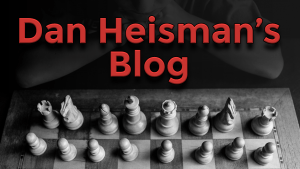Q&A with Coach Heisman Nov 29, 2013
"Are you an aggressive player or defensive player?"
Answer: Always play with confidence, aggression, and respect for your opponent's moves and ideas. Chess is not the type of game where you can just stick your head in the ground and say "Don't hurt me!" The only way to stop your opponent is to go after him.
Almost 40 years ago (!?) I was asked to play a friend of a friend anonymously. My proposed opponent had been beating everyone at chess during their weekly meeting at the local bar, so our mutual friend asked me to play him without telling him who I was. As expected, my opponent came after me aggressively three games in row - they were all tense games but eventually I was just too good for him and I won all three.
After those three he said "What's going on here? I have never lost to anyone two games in a row and this guy beats me three." Then our mutual friend, with some amusement, admitted his sneaky idea: "Oh, I forgot to tell you - Dan is a US Chess Federation Expert and recently won the championship of Philadelphia."
"No wonder! Let's play again..." But this time my now alerted opponent played very passively and I was able to win three further games much more easily. He played a lot better the first three games, when he thought he was going to win and tried to do so. This meshes with some good advice someone gave me when I started playing in tournaments: "Want to get a draw with a higher-rated player? Then try to beat him and if that fails you might get a draw!" 
This adage also meshes with the tale of my first game with a master. To make a long story short, I was rated about 550 points lower but, in following the advice stated above, I was not afraid and I managed to win(!). After the game I asked NM Rich Pariseau, the President of our chess club "Mr. Pariseau, how did I beat the master?" Rich gave me that funny look he does when I ask a silly question and chuckled "Well, you played better, of course!" 
"Is it OK, for me, a player with rating X, to play 1.Nf3?" (another asked about the Modern Benoni, etc). It's strange anyone would think it's not OK to play pretty much any mainstream opening. The important thing about openings is that you follow good opening principles when you inevitably get taken out of your "book". That will always lead you to a playable game. Also, you should look up your opening moves after each game, fast or slow, and ask "If my next opponent played the same way, where would I differ/improve?" and not make the same mistake twice, if possible (see Learning Opening Lines and Ideas). I guess GM Lev Alburt must agree, as he particularly included my quote "Any opening that you know well is good no matter what it's reputation." as Principle #283 in his book (with Al Lawrence) Chess Rules of Thumb. And as GM Soltis points out in his book Grandmaster Secrets: Openings, just because a line is unpopular or out of style with the top players does not mean it isn't suitable, or even recommendable, for most average players. For more on this, check out my blog What's a Good Opening?
A couple questions brought up the idea of avoiding "Hand-waving" in analytical positions, like many in the endgame. Hand-waving is using general principles to select a move instead of careful analysis in positions that require careful analysis. I further pointed out that a few of Anand's endgame errors against Carlsen were not due to "lack of knowledge" about the endgame, but rather than in some instances Anand played too fast for the position (given his clock situation, too), and that Carlsen was often willing to do a little more work on each move carefully analyzing the consequences. Much of good endgame play is based on this careful calculation, which augments, and not replaces, your endgame knowledge.
As an example of hand-waving, I gave the following position (White to play after 1...Bxf6):
The only way to figure out whether White should choose 2.Kxf6 or 2.exf6 is by careful analysis, working out whether each wins or draws (White is ahead a pawn either way and should not lose!). To use a principle like "Don't unnecessarily double your pawns" in such a position - as several students did when presented with this position - would be a tragedy. Although using principles and weighing the Pros and Cons is exactly what you would do in the opening or some middlegame positions when you can't calculate exactly what will happen, in a deep endgame like this one, you must try to carefully work out the lines to the end (i.e. to a position where you know it's clearly a draw or win). Never apply a principle when your analysis tells you what you should do; relying solely on principles is for positions where you don't - or can't - know what to do and can't analyze. Here you can. As I told NM Dan Benjamin (now an Economics professor at Cornell) when he was young "If you can calculate that a move wins, then just play it - it doesn't matter how many principles it breaks."
For a complete analysis of the position, see my Novice Nook "Analysis Insights" - but I suggest you don't peek until after you try it yourself.
That brought up another interesting point. I got several questions about improvement that could have been trivially answered (in most cases, much better) by anyone perusing my Novice Nook page for a few minutes. I understand I wouldn't have a show if everyone could look up all the answers instead of asking "live" questions, and I am happy to give at least a brief answer to any legitimate question (the really general ones like "How do I improve?" are legitimate but hardly answerable in 2 minutes on a TV show). Moreover, I am glad I am getting new viewers who have first found the show but are not familiar with my prior work.
As part of answering these questions, it often comes across that I have a couple hundred carefully indexed articles, including both Chess.com material and Novice Nooks indexed by subject on how to improve. Once that is known, I hope most who ask these "open" questions would be at least be somewhat curious as to how they can get much more comprehensive answers to even wide, open, questions inappropriate to the show (some viewers are, of course, but not all). I am always very glad to be your guide with a brief answer and where and how you can easily find the more comprehensive one. Nevertheless, I feel bad that some viewers are so desperate to learn but, even when presented with this key, apparently don't take advantage of a resource that would be so additionally helpful for what they want to know. It's all there for the taking...
Ironically this leads to the next question "What questions would you liked to be asked on the show?" Although the title of the show includes "Coach Heisman", we get so many questions on improvement that any question outside that topic: current events, history, rules, rating, tournament organization, computer chess, etiquette, etc. are most welcome.
One viewer asked "Can I ask a question?" and my answer was "Yes, you can, and we limit questions to one viewer per show, so that is yours." Then he followed up with "Does that count as my question?" and I replied "Yes, but now you have two, so you are over the limit!" 
Hope all the US readers (and anyone else who wishes to celebrate) had a great Thanksgiving.
[Over 6,000 views, thanks! If each viewer was also a follower of my Chess Tip of the Day @danheisman on Twitter, that would at least double the number of my Twitter followers!  ]
]
["Coach Heisman" - I guess I am the second most famous "Coach Heisman" since my great-grandfather Aaron's first cousin John Heisman was the coach who, in the 1930's, left the endowment for American college football's Heisman Trophy. BTW, our family name is pronounced with an "s" sound and not a "z" as commonly mispronounced by many American football sportscasters.  ]
]
Next show will be Dec 13 - another Friday the 13th! - and is open to all.






